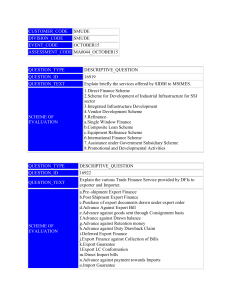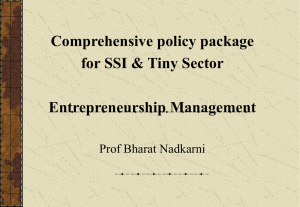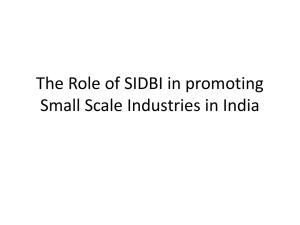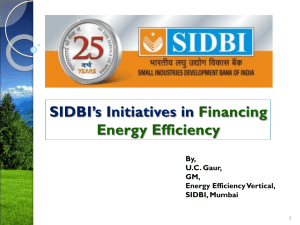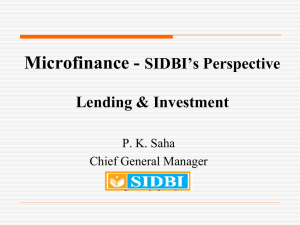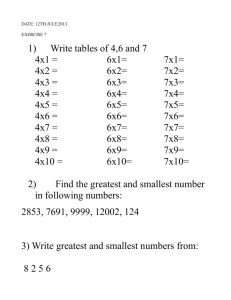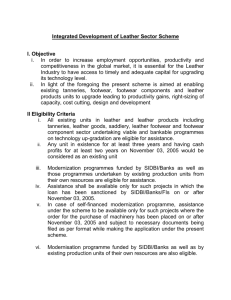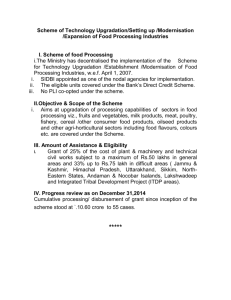ISSN: 2278-6236 PERFORMANCE EVALUATION OF SIDBI: A STUDY FROM 2007-08 TO 2011-12
advertisement
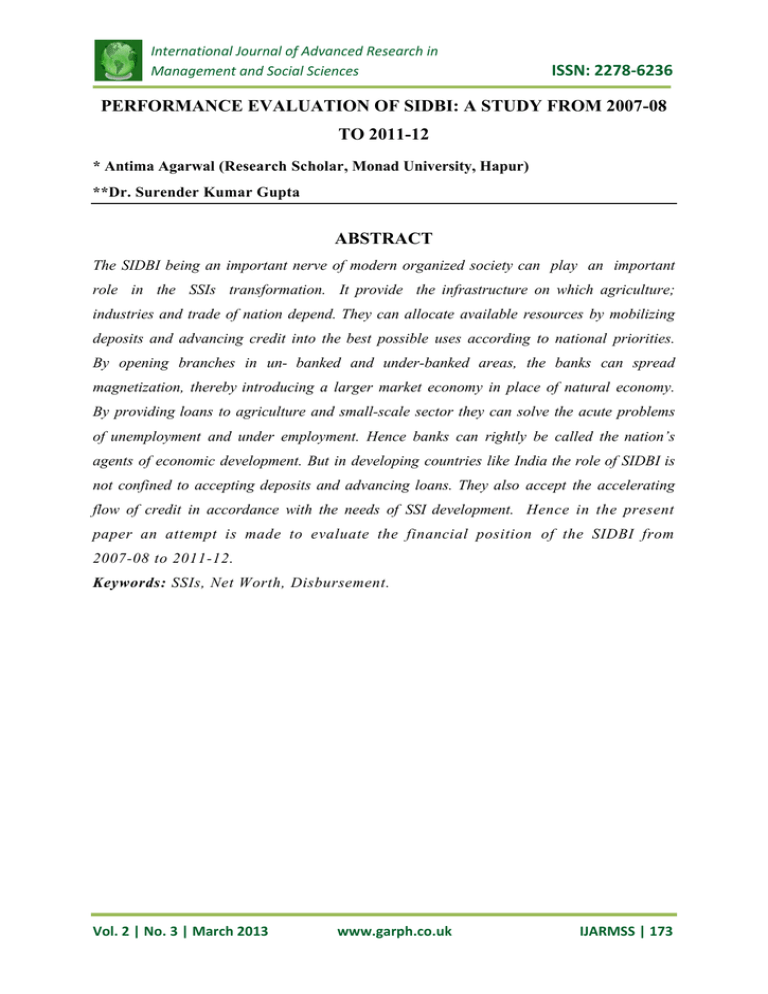
International Journal of Advanced Research in Management and Social Sciences ISSN: 2278-6236 PERFORMANCE EVALUATION OF SIDBI: A STUDY FROM 2007-08 TO 2011-12 * Antima Agarwal (Research Scholar, Monad University, Hapur) **Dr. Surender Kumar Gupta ABSTRACT The SIDBI being an important nerve of modern organized society can play an important role in the SSIs transformation. It provide the infrastructure on which agriculture; industries and trade of nation depend. They can allocate available resources by mobilizing deposits and advancing credit into the best possible uses according to national priorities. By opening branches in un- banked and under-banked areas, the banks can spread magnetization, thereby introducing a larger market economy in place of natural economy. By providing loans to agriculture and small-scale sector they can solve the acute problems of unemployment and under employment. Hence banks can rightly be called the nation’s agents of economic development. But in developing countries like India the role of SIDBI is not confined to accepting deposits and advancing loans. They also accept the accelerating flow of credit in accordance with the needs of SSI development. Hence in the present paper an attempt is made to evaluate the financial position of the SIDBI from 2007-08 to 2011-12. Keywords: SSIs, Net Worth, Disbursement. Vol. 2 | No. 3 | March 2013 www.garph.co.uk IJARMSS | 173 International Journal of Advanced Research in Management and Social Sciences ISSN: 2278-6236 INTRODUCTION The SIDBI being an important nerve of modern organized society can play an important role in the SSIs transformation. It provide the infrastructure on which agriculture; industries and trade of nation depend. They can allocate available resources by mobilizing deposits and advancing credit into the best possible uses according to national priorities. By opening branches in un- banked and under-banked areas, the banks can spread magnetization, thereby introducing a larger market economy in place of natural economy. By providing loans to agriculture and small-scale sector they can solve the acute problems of unemployment and under employment. Hence banks can rightly be called the nation’s agents of economic development. But in developing countries like India the role of SIDBI is not confined to accepting deposits and advancing loans. They also accept the accelerating flow of credit in accordance with the needs of SSI development. They have shifted from restricted old conservative policies to modern banking with lots of new techniques, which brings dynamism and innovation in their functioning. The Government of India and the State government have been pursuing a policy of protecting and promoting small-scale industries for a long time. Small- scale industries have been accorded pride of place in the planned industrialisation process of the Indian economy, which is characterized by among other factors low productivity in the SSIs abundant labour and scarcity of capital. The comparatively easy dispersal of small-scale industries in the rural and economically backward areas has an added advantage of increasing incomes in these places. They can contribute to production and generate employment absorbing relatively a smaller amount of capital ensure a more equitable distribution of income and facilitate effective mobilization of capital and skills which would otherwise remain unutilized. The Small Industries Development Bank of India (SIDBI) was set up in1990 under an Act of Parliament- the SIDBI Act, 1989. The charter establishing SIDBI envisaged SIDBI to be “the principal financial institution for the promotion, financing and development and development of industries in the small scale sector and to coordinate the functions of other institutions engaged in similar activities.” Financial soundness is very important for the success in whole the business. Efficiency of other parts of the business is depend upon the efficiency of the finance department. Hence it is very imperative to evaluate the financial position of SIDBI. In the present study efforts are made to evaluate the financial position of the SIDBI from 2007-08 to 2011-12. Vol. 2 | No. 3 | March 2013 www.garph.co.uk IJARMSS | 174 International Journal of Advanced Research in Management and Social Sciences ISSN: 2278-6236 OBJECTIVES OF THE STUDY 1. To evaluate the financial position of the SIDBI. 2. To find the trend in the financial performance of the SIDBI. MEASURES FOR PERFORMANCE EVALUATION OF SIDBI To evaluate the financial position of the SIDBI various measures are used in the present study, such as net worth, paid up capital, total income, net profits, reserves & funds, dividend to shareholders etc. DATA ANALYSIS 1. Paid up Capital: Table No. 1 Show paid up capital of the SIDBI during the period of the study. Table:1 Paid up Capital Particulars Paid Up Capital (Rs. In Crore) 2007-08 2008-09 2009-10 2010-11 2011-12 Average 450 450 450 450 450 450 Graph:1 Paid Up Capital 500 450 450 450 450 450 450 400 Rs. in Crore 350 300 250 200 Paid up Capital 150 100 50 0 2007-08 2008-09 2009-10 2010-11 2011-12 Years Compiled Personally from annual Reports From the above table and graph it is clear that the paid up capital of the SIDBI is Rs. 450 Crore during the whole period of the study. Vol. 2 | No. 3 | March 2013 www.garph.co.uk IJARMSS | 175 International Journal of Advanced Research in Management and Social Sciences 2. ISSN: 2278-6236 Reserves & Fund: Reserves & Funds of the SIDBI is shown by the tableNo.2. High reserve and funds shows better financial position. Table:2 Reserves & Fund Particulars (Rs. In Crore) 2007-08 Reserves & 2008-09 4809.8 2009-10 5149.4 2010-11 5457.2 5868.4 2011-12 Average 6327.9 5522.54 Fund Graph:2 Reserves & Fund 7000 6000 Rs. in Crore 5000 5149.4 4809.8 5457.2 5868.4 6327.9 4000 3000 Reserves & Fund 2000 1000 0 2007-08 2008-09 2009-10 2010-11 2011-12 Years Compiled Personally from annual Reports While studying the above table and graph we find that the reserve and funds are Rs. 4809.8 crore during the first year of the study i.e. 2007-08. During 2008-09 reserves and funds are 5149.4 crore, while these are Rs. 5457.2 crores during 2009-10. Reserves and funds increased to Rs. 5868.4 crore during the year 2010-11 and finally in the last year of the these become to Rs. 6327.9 crore. From the above discussion we find that the reserves and funds shows increasing trend during the whole period of the study. 3. Total Income: A high total income shows financial soundness of the company. Total income of the SIDBI include both interest income and non interest income. Vol. 2 | No. 3 | March 2013 www.garph.co.uk IJARMSS | 176 International Journal of Advanced Research in Management and Social Sciences ISSN: 2278-6236 Table:3 (Rs. In Crore) Total Income Particulars 2007-08 2008-09 2009-10 2010-11 2011-12 Average Total 1638.2 2082.3 2539.8 3442.8 3870.4 2714.7 Income Graph:3 Total Income 4500 3870.4 4000 3442.8 Rs. in Crore 3500 3000 2539.8 2500 2000 2082.3 1638.2 Total Income 1500 1000 500 0 2007-08 2008-09 2009-10 2010-11 2011-12 Years Compiled Personally from annual Reports Above table and graph shows total income earned by the SIDBI during the period of the study. Total income of the SIDBI was Rs. 1638.2 crores during 2007-08. During 2008-09 total income was 2082.3 crore, while it was Rs. 2539.8 crore in the 2009-10. In the last year of the study i.e. 2011-12 the total income was Rs. 3870.4 crore. Average total income of the SIDBI during the period of the study was Rs. 2714.7 crore. 4. Net Profit: Net profit of the SIDBI is shown by the Table No.4. High net profits shows better financial position. Table:4 Net Profit (Rs. In Crore) Particulars 2007-08 2008-09 2009-10 2010-11 2011-12 Average Net Profit 198.4 299.2 421.3 513.8 566.9 399.92 Vol. 2 | No. 3 | March 2013 www.garph.co.uk IJARMSS | 177 International Journal of Advanced Research in Management and Social Sciences ISSN: 2278-6236 Graph:4 Net Profit 566.9 600 513.8 500 Rs. in Crore 421.3 400 299.2 300 200 198.4 Net Profit 100 0 2007-08 2008-09 2009-10 2010-11 2011-12 Years Compiled Personally from annual Reports Above table and graph shows Net Profit earned by the SIDBI during the period of the study. Net Profit of the SIDBI was Rs. 198.4 crores during 2007-08. During 2008-09 Net Profit was 299.2 crore, while it was Rs. 421.3 crore in the 2009-10. In the last year of the study i.e. 2011-12 the Net Profit was Rs. 566.9 crore. Hence it can be concluded that net profit shows increasing trend during the period of the study. 5. Dividend to Shareholders: Dividend paid to Shareholders is shown by the table no. 5. High dividend payment shows financial soundness of the company. Table:5 Dividend to Shareholders (Rs.) Particulars 2007-08 2008-09 2009-10 2010-11 2011-12 Average Dividend to 67.5 67.5 112.5 112.5 112.5 94.5 Shareholders Vol. 2 | No. 3 | March 2013 www.garph.co.uk IJARMSS | 178 International Journal of Advanced Research in Management and Social Sciences ISSN: 2278-6236 Graph:5 Dividend to Shareholders 112.5 120 112.5 112.5 100 Rs. 80 67.5 67.5 60 Dividend to Shareholders 40 20 0 2007-08 2008-09 2009-10 2010-11 2011-12 Years Compiled Personally from annual Reports The dividend to shareholders of SIDBI was Rs. 67.5 in the year 2007-08 and 2008-09 then it increase and reached at Rs. 112.5 in the remaining period of the study The average dividend to shareholders of the SIDBI during the period of study was Rs. 94.5. 6. Assistance Sanctioned: Financial assistance sanctioned by the SIDBI is shown by the table no.6. Table:6 Assistance Sanctioned By SIDBI (Rs. In Crore) Particulars 2007-08 2008-09 2009-10 2010-11 2011-12 Average Assistance 16164 29188 35521 42214 49910 34599.4 Sanctioned By SIDBI Vol. 2 | No. 3 | March 2013 www.garph.co.uk IJARMSS | 179 International Journal of Advanced Research in Management and Social Sciences ISSN: 2278-6236 Graph:6 Assistance Sanctioned By SIDBI 60000 49910 Rs. in Crore 50000 42214 35521 40000 29188 30000 20000 16164 Assistance Sanctioned By SIDBI 10000 0 2007-08 2008-09 2009-10 2010-11 2011-12 Years Compiled Personally from annual Reports Figure 6 exhibits the assistance sanctioned by SIDBI during five financial years viz. 2007-08, 2008-09, 2009-10, 2010-11, and 2011-12. During the year 2007-08 SIDBI has sanctioned assistance worth Rs. 16164 cr for the industrial development. During the fiscal year 2008-09 the assistance sanctioned by the bank was stood at Rs. 29188 cr. During the fiscal year 200910 there was hike in the amount and the Bank has sanctioned Rs.35521 cr. assistance. In the fiscal year 2010-11 there was increase in the assistance and the bank has sanctioned Rs. 42214 as assistance. But again there was good growth in the fiscal year 2011-12 when bank has sanctioned assistance worth Rs.49910 cr. 7. Disbursement: Disbursement are shown by table no.7. High disbursement means high financial assistance by the SIDBI. Table:7 Disbursement by SIDBI (Rs. In Crore) Particulars 2007-08 2008-09 2009-10 2010-11 2011-12 Average Disbursement 15087 28298 31918 38796 41360 31091.8 by SIDBI Vol. 2 | No. 3 | March 2013 www.garph.co.uk IJARMSS | 180 International Journal of Advanced Research in Management and Social Sciences ISSN: 2278-6236 Graph:7 Rs. in Crore Disbursement by SIDBI 45000 40000 35000 30000 25000 20000 15000 10000 5000 0 38796 41360 31918 28298 15087 Disbursement by SIDBI 2007-08 2008-09 2009-10 2010-11 2011-12 Years Compiled Personally from annual Reports While seeing the above Fig. 7 we can estimate the performance of SIDBI in disbursement of assistance to various industries. In the first year of the study i.e. in 2007-08 the bank has disbursed assistance worth Rs. 15087 cr for the industrial development. During the fiscal year 2008-09 the assistance disbursed by the bank was stood at Rs. 28298 cr. During the fiscal year 2009-10 again there was hike in the amount and the Bank has disbursed Rs.31918 cr. assistance. In the fiscal year 2010-11 again there was hike in the assistance and the bank has disbursed Rs.38796 cr. as assistance. In the last year i.e. 2011-12 the bank has disbursed Rs. 41360 cr.. 8. Net Worth: Net worth of the SIDBI during the period of the study is shown by the table no.8. Table:8 Net Worth (Rs. In Crore) Particulars 2007-08 2008-09 2009-10 2010-11 2011-12 Average Net Worth 4713 5342 5612 5979 6399 5609 Vol. 2 | No. 3 | March 2013 www.garph.co.uk IJARMSS | 181 International Journal of Advanced Research in Management and Social Sciences ISSN: 2278-6236 Graph:8 Net Worth 7000 Rs. in Crore 6000 5612 5342 5979 6399 4713 5000 4000 3000 Net Worth 2000 1000 0 2007-08 2008-09 2009-10 2010-11 2011-12 Years Compiled Personally from annual Reports Above table and graph shows Net Worth of SIDBI, during the period of the study. In the fiscal year 2007-08 net worth was Rs.4713 cr. In the financial year 2008-09 there was good growth and the Net Worth stood at Rs.5342 cr. In the next fiscal year i.e. 2009-10 the net worth of the bank was Rs.5612 cr. During the period 2010-11 the bank was functioning with a Net-Worth of Rs.5979cr. In the last year of the study i.e. 2011-12 the net worth of the bank was Rs. 6399 cr. Average Net Worth of the bank during the period of the study was Rs.5609 crore. CONCLUSION In the present paper researcher attempt to evaluate the financial position of the SIDBI from 2007- 08 to 2011-12. In the present paper various parameters are used to evaluate the financial position of the SIDBI. After evaluating all the parameters individually researcher find that all the parameters which are used to evaluate financial position are increasing. They all shows increasing trend during the period of the study. Hence, in the end we can conclude that the financial position of the SIDBI is very sound during the period of the study. REFERENCES 1. A.K., Vashisht, “Performance Appraisal of Commercial Banks in India”, 1987 (A Thesis submitted to the Department of Commerce and Business Management, HPU, Shimla). 2. BHAYANI S. J., Practical Financial Statements Analysis, 2004, Raj Book Vol. 2 | No. 3 | March 2013 www.garph.co.uk IJARMSS | 182 International Journal of Advanced Research in Management and Social Sciences ISSN: 2278-6236 Enterprises – Jaipur. 3. Bhole L.M., Financial Institutions and Markets, Tata McGraw-Hill Publication Company, 1992. 4. Garg, S.C. (1989), Indian Banking: Cost and Profitability, Anmol Publications, New Delhi 5. Khan M.Y., Indian Financial System, Tata McGraw-Hill Publication Company Limited, New Delhi, 2005, pp. 14.1-14.7. 6. Reserve Bank of India, Reports on Trend and Progress of Banking in India, 2007-08 to 2011-12. 7. The journal of Indian Institute of Banking and Finance, vol-81, Jan-March 2011. http://www.sidbi.com http://www.smallindustries.com. Vol. 2 | No. 3 | March 2013 www.garph.co.uk IJARMSS | 183
